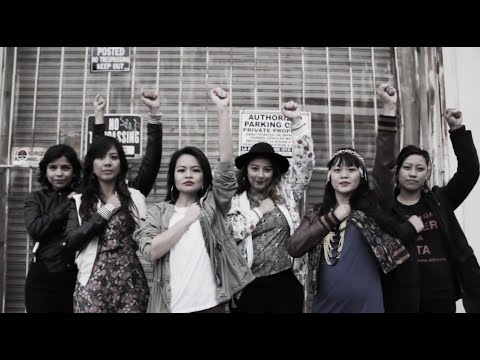ANA TIJOUX: ‘WE CAN’T THINK OF A FEMINISM, AN ANTI-PATRIARCHY, WITHOUT ANTI-CAPITALISM’
by Ana María Tijoux

Woman, daughter, mother, comrade, singer, feminist and much more.
Originally published in Spanish here
Translated to English by Committee on U.S.-Latin American Relations
Another feminism
We face relentless violence, and we live in cold times. We’re facing historic moments in which the speed of the market and its depraved nature are gnawing down the essence of humanity, turning the world toward a fascism exacerbated to unprecedented levels. In addition, being provoked is a tremendous barbarism of genocide perpetuated for centuries against women. It’s a naturalized, state-sanctioned, normalized and deepening fascism, whose waves of violence seem to measure the strides of a giant. “Es un monstruo grande que pisa fuerte,” they used to sing. It’s a big monster that stomps hard. History – our history – is an unavoidable witness to that.
I have the privilege of traveling for my work, and when I travel I observe, listen, collaborate, watch, and learn to see myself. Nevertheless, there’s never a trip I take where gender-based violence doesn’t shake me to the core and doesn’t call out to my conscience. From our colleagues in Mexico, the forensic anthropologists who carry out their work millimeter by millimeter, identifying the bones of thousands of women who have been murdered, to conversing with the daughter of Berta Caceres, who was cruelly murdered in Honduras, who I met in Spain while she was pleading her case to multinational companies guilty of her mother’s death, to hearing the story of Rut, an Ecuadorian woman, whose 11-year-old daughter was found brutally raped and murdered in her school, to reading the stories of women killed in Wallmapu, to Macarena Valdés, found hanged in a so-called suicide, when she was fighting against a hydroelectric project that’s being built in Tranguil, Panguipulli [Chile].
So here this question is key: What do we mean when we speak of feminism? Feminism cannot be defined at the surface level, when there is an [economic] model that seeks to rob it of the essence of its strength. Feminism is not a T-shirts you can buy in a department store. This struggle is much larger than a TV slogan. It’s a struggle that is only renewed by restoring the historical memory of our women fighters, those who have been forgotten in the dustbins of revolutions, and by texts that awaken our thought processes, against a patriarchy that is reproduced in our bodies and in our lives, in school, in our social lives, even in the smallest and most intimate parts.
We cannot think of a feminism, an anti-patriarchy, without anti-capitalism, without anti-fascism, without anti-racism and without class struggle. All of these struggles are one struggle, and they require a historic political push with perfect coordination. It’s our imperative to take on the task of re-empowering the concept of feminism, and to break the chains of misleading and victimizing publicity. Women fighters have their skirts on, so to speak, fighting a war perpetuated throughout all of history, and for all of the women who went before, it’s our turn to ally ourselves, deepen our commitment and act.
Feminism is liberation, and for that reason we must liberate ourselves from the oppression of capital. “Another feminism” isn’t a slogan, it’s a daily act, simple but strong. It’s transformation, it’s community. It’s freedom.
